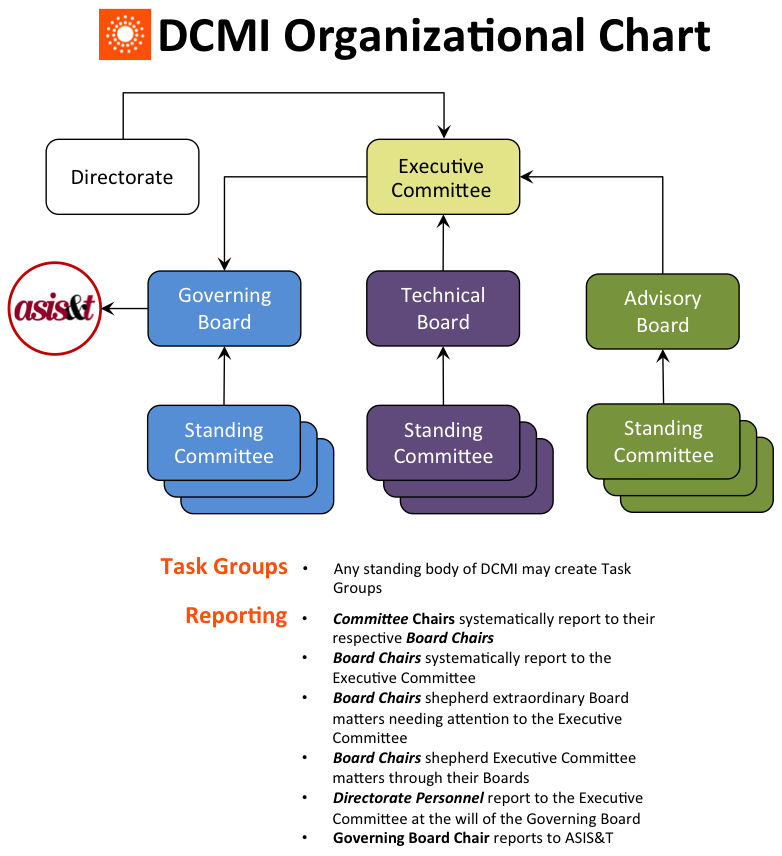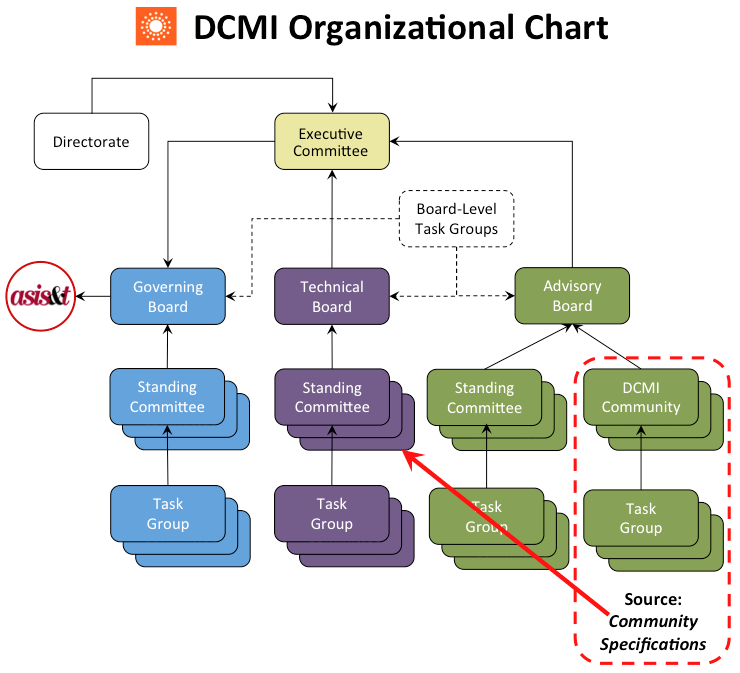orgStructure
Handbook: Table of Contents
- ► Governing Board committees: Membership & Finance ◘ Nominations & Bylaws
- ► Technical Board committees: Usage ◘ Standards & Liaisons ◘ Community Specifications ◘ Infrastructure Advisory Committee (IAC)
- ► Advisory Board committees: Conferences & Meetings ◘ Education & Outreach
- ► Management: Executive ◘ Directorate
Contents |
DCMI Organizational Structure
- DCMI is comprised of Boards, Standing Committees of the Boards, Communities, an Executive Committee, and a Directorate. Any of these entities (except for the Directorate) may create Task Groups for specific work items. Their roles are outlined in the DCMI Bylaws and defined in more detail in a DCMI Handbook. Changes in the organizational structure implemented in 2014 are discussed in a Restructuring FAQ.
Restructuring FAQ
Boards
-
Governing Board (GB): Wiki
-
-
The Governing Board oversees the activities and management of DCMI, provides strategic direction to matters of finance and policy and its Directorate and contributes to the promotion of the Initiative through liaisons with the public and private sectors. The Chair of the Governing Board also chairs the Executive Committee and presides over the DCMI as overall Director.
-
-
Advisory Board (AB): Wiki
-
-
The Advisory Board is the primary advisory body of DCMI regarding the technical, strategic and programmatic matters of the Initiative. The Board has three roles: (1) to conduct periodic, systematic environmental scans to assess and articulate current drivers and enablers of innovation in the metadata ecosystem in order to inform the focus of DCMI’s work agenda; (2) to liaise with the stakeholder community and other global metadata initiatives; and (3) to significantly assist in executing and shaping DCMI's mission, goals and objectives through the activities of the Board's Standing Committees, Communities and Task Groups.
-
-
Technical Board (TB): Wiki
-
-
The Technical Board is the organizational body that ensures the publication and maintenance of DCMI technical and semantic specifications in accordance with DCMI policy, including specifications to which DCMI has made a long-term maintenance commitment, DCMI specifications published by formal standards organizations, and specifications published as the product of DCMI communities.
-
DCMI Management
- Executive Committee: Wiki
-
-
The Executive Committee, comprised of the chairs and chairs-elect of DCMI’s three boards, has two general purposes: (1) to represent the interests, concerns and agenda of their respective boards in collaborative Committee deliberations and decision-making; and (2) to provide a means for routine DCMI management decisions to be made without the full convening of the members' respective boards while maintaining the authority of the boards.
-
-
Directorate: Wiki
-
-
The Directorate consists of compensated directors who support the Executive Committee and DCMI’s three Boards through the provision of specific services in areas such as financial management, required reporting, and the development and execution of DCMI activities. The exact roles of directors may change from time to time depending on the administrative and programmatic needs and resources of DCMI.
-
Standing Committees
- Chairs of all DCMI committees periodically report to their respective Board Chairs in a manner defined by the Policies and Operating Procedures for their committees and otherwise report on proposed committee actions.
- Community Specifications (TB): Wiki
-
-
The Community Specifications Committee develops and applies policies and procedures for the orderly recognition and publication of DCMI Community Specifications developed through broad community consensus and demonstrating best practices in design and execution. The Committee actively supports the stakeholder community and works with DCMI Communities and Task Groups, as well as appropriate DCMI members and stakeholder organizations, in development of new specifications and vocabularies and their possible publication as DCMI Community Specifications with accompanying best practice documentation. The Committee is responsible for managing the criteria and process of declaring a 3rd party resource as a DCMI Recommended Resource.
-
- Conferences & Meetings (AB): Wiki
-
-
The Conferences & Meetings Committee determines policy, operations and the master planning calendar for DCMI conferences and meetings. The Committee actively works on, and promotes, the annual conferences and regional meetings including, but not limited to, determining host organizations, co-location with other organizations, appropriate meeting themes, recruiting chairs and committee members for specific events, and other related meeting activities.
-
- Education & Outreach (AB): Wiki
-
-
The Education & Outreach Committee determines policies and procedures and develops the master planning calendar for DCMI education and training, user best practice documentation, and outreach activities. The Committee actively identifies potential areas for development and delivery of education and training in support of innovative metadata design and best practice and develops user documentation and other types of published resources supporting learners and teachers and trainers. The Committee develops educational programs including tutorials, workshops, online "how-to" recipes and webinars and is responsible for recruiting chairs to organize educational programs. The Committee manages DCMI's outreach through website announcements and social media channels.
-
- Membership & Finance (GB): Wiki
-
-
The Membership & Finance Committee is charged with managing matters related to DCMI’s revenues, expenditures and the DCMI Membership program including development of programs to enhance DCMI's membership capacity.
-
- Nominations & Bylaws (GB): Wiki
-
-
The Nominations & Bylaws Committee is charged to manage nomination of candidates for office, schedule and conduct annual elections, and propose changes to the DCMI By-laws as needed.
-
- Standards & Liaisons (TB): Wiki
-
-
The Standards Committee manages DCMI's activities as an "ISO liaison organization" and shepherds DCMI through the periodic review and renewal of the existing ISO and ANSI/NISO standards. The Committee maintains and publishes the calendar of necessary activities within the Initiative for timely review of existing standards and the creation of new standards. The Committee works closely with the other Committees of the Technical Board in the processes of review and revision of standards embodying DCMI specifications such as ISO Standard 15836 and ANSI/NISO Standard Z39.85. The Committee initiates and manages the community stakeholder engagement necessary to the effective representation of community interests in the deliberations of relevant standards bodies.
-
- Usage (TB): Wiki
-
-
The Usage Committee serves as DCMI's decision-making body on technical specifications to which DCMI, as an organization, makes a long-term maintenance commitment (i.e., periodic review on the basis of published principles). The commitment applies first and foremost to DCMI Metadata Terms in its machine- and human-readable manifestions, to international standards based on the Terms (such as ISO 15836), to mappings to related vocabularies, to DCMI's vocabulary maintenance policies, and it includes agreements with other vocabulary owners, such as the Agreement between DCMI and the FOAF Project. The Committee may extend this scope in accordance with procedures set out in the Committee's Process Manual and in relevant sections of the DCMI Bylaws, subject to oversight by the Governing Board.
-
Communities & Task Groups
-
Communities:
-
-
DCMI Communities are ongoing interest groups that bring together people interested in a specific topic related to Dublin Core metadata or metadata best practices in a particular domain. DCMI Communities are moderated by one or two moderators. They have a mailing list for discussion and exchange of information. Participation in a DCMI Community is open to anybody who subscribes to the open mailing list. Communities may from time to time create Task Groups with set timeframes and charges to accomplish well defined tasks such as development of draft Community Specifications.
-
A listing of existing DCMI Communities can be found on the DCMI website.
-
-
Task Groups:
-
-
DCMI Task Groups are established around a specific set of activities leading to a set of deliverables. Task groups are led by one or two Task Group leaders and consist of a group of people who commit to help perform the defined tasks. Task Groups may have a Web page, a Wiki and a mailing list. Anybody can ask to participate in a Task Group; the Task Group leaders are responsible for assigning tasks to the members. Task Groups are created by either a DCMI Community or Board to which the Task Groups' leaders systemically report on Task Group progress. Task Groups pursue DCMI endorsement of draft Community Specifications through submission to the Technical Board's Community Specifications Committee.
-
A listing of active Task Groups can be found on the DCMI website
-


